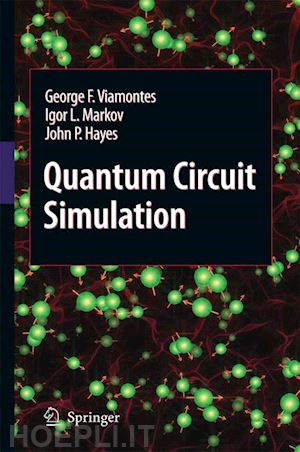
Questo prodotto usufruisce delle SPEDIZIONI GRATIS
selezionando l'opzione Corriere Veloce in fase di ordine.
Pagabile anche con Carta della cultura giovani e del merito, 18App Bonus Cultura e Carta del Docente
Quantum Circuit Simulation covers the fundamentals of linear algebra and introduces basic concepts of quantum physics needed to understand quantum circuits and algorithms. It requires only basic familiarity with algebra, graph algorithms and computer engineering. After introducing necessary background, the authors describe key simulation techniques that have so far been scattered throughout the research literature in physics, computer science, and computer engineering. Quantum Circuit Simulation also illustrates the development of software for quantum simulation by example of the QuIDDPro package, which is freely available and can be used by students of quantum information as a "quantum calculator."
George Viamontes has a Ph.D. in Computer Science and Enginering from the University of Michigan where his research was focused on quantum circuit simulation. Through a Department of Energy fellowship for high-performance computer science, he completed a portion of his graduate research at Los Alamos National Laboratory. Upon graduation, Dr. Viamontes spent a year at Lockheed Martin Advanced Technology Laboratories where he continued to work on quantum circuit simulation. Currently he develops and implements algorithms for high-frequency automated trading and continues to consult for Lockheed Martin on quantum computing projects.
Igor L. Markov is an associate professor of Electrical Engineering and Computer Science at the University of Michigan. He received his Ph.D. in Computer Science from UCLA. Currently he is a member of the Executive Board of ACM SIGDA, Editorial Board member of Communications of ACM, ACM TODAES, IEEE Transactions on Computers, IEEE Transactions on CAD, as well as IEEE Design & Test. Prof. Markov researches computers that make computers. He has co-authored two books and more than 160 refereed publications, some of which were honored by the best-paper awards at the Design Automation and Test in Europe Conference (DATE), the Int'l Symposium on Physical Design (ISPD) and IEEE Trans. on Computer-Aided Design. Prof. Markov is the recipient of a DAC Fellowship, an ACM SIGDA Outstanding New Faculty award, an NSF CAREER award, an IBM Partnership Award, and a Microsoft A. Richard Newton Breakthrough Research Award.
John P. Hayes received the B.E. degree from the National University of Ireland, Dublin, and the M.S. and Ph.D. degrees from the University of Illinois, Urbana-Champaign, all in electrical engineering. While at the University of Illinois, he participated in the design of the ILLIAC III computer. In 1970 he joined the Operations Research Group at the Shell Benelux Computing Center in TheHague, where he worked on mathematical programming and software development. From 1972 to 1982 he was a faculty member of the Departments of Electrical Engineering–Systems and Computer Science of the University of Southern California, Los Angeles. Since 1982 he has been with the Electrical Engineering and Computer Science Department of the University of Michigan, Ann Arbor, where he holds the Claude E. Shannon Endowed Chair in Engineering Science.











Il sito utilizza cookie ed altri strumenti di tracciamento che raccolgono informazioni dal dispositivo dell’utente. Oltre ai cookie tecnici ed analitici aggregati, strettamente necessari per il funzionamento di questo sito web, previo consenso dell’utente possono essere installati cookie di profilazione e marketing e cookie dei social media. Cliccando su “Accetto tutti i cookie” saranno attivate tutte le categorie di cookie. Per accettare solo deterninate categorie di cookie, cliccare invece su “Impostazioni cookie”. Chiudendo il banner o continuando a navigare saranno installati solo cookie tecnici. Per maggiori dettagli, consultare la Cookie Policy.